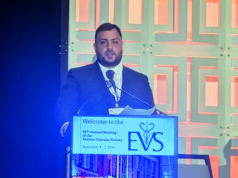
Biotronik today announced that it has concluded the BIO-OSCAR SOC study evaluating the baseline against which to measure the Oscar multifunctional catheter in treating complex peripheral arterial disease (PAD). The outcomes were presented at the Paris Vascular Insights (PVI) course 2024 (12–14 December, Paris, France) by principal investigator Koen Deloose (AZ Sint Blasius Hospital, Dendermonde, Belgium).
BIO-OSCAR SOC is a prospective, multicentre, observational trial assessing the current standard of care, procedural outcomes, complication handling and device use in endovascular treatments for atherosclerotic lesions both above the knee (ATK) and below the knee (BTK).
The study analysed data from 247 patients across 16 European CE-mark territories, aiming to deliver insights into real-world practices for managing PAD.
“BIO-OSCAR SOC is an important step toward understanding the treatment of complex infrainguinal lesions under current standard-of-care practices, and especially how important vessel preparation can be,” Deloose remarked in a press release announcing the results. “With this baseline study, we aim to evaluate [how] the Oscar catheter can streamline procedures by minimising the need for multiple device exchanges, reducing procedural steps, and lowering complications.”
The primary endpoint of BIO-OSCAR SOC was procedural success, defined as a combination of technical success—achieving ≤30% residual stenosis following vessel preparation and prior to the definitive treatment—and the absence of complications such as target-vessel perforation, rupture, acute occlusion, or distal embolisation.
The outcomes, as outlined in the press release, show:
- 50% procedural success in ATK and 59% in BTK lesions.
- 94% crossing success in chronic total occlusions (CTO) for ATK and 90% for BTK.
- 50% bailout stenting rate in ATK cases, highlighting that vessel preparation is often insufficient. Biotronik notes that appropriate vessel preparation may significantly improve short- and long-term outcomes.
The procedural cost related to access, crossing and vessel preparation averages €750, while for complex cases the cost can go up to €1,100.
Biotronik shares that the clinical evidence will be further validated by the BIO-OSCAR FIRST study, which is designed to confirm the safety and clinical performance of the Oscar catheter for dilation of lesions in the femoral, popliteal, and infrapopliteal arteries, including both ATK and BTK lesions.
“This study provides the vascular community with valuable insights into existing procedural success rates and cost-efficiency data,” said Stuart Perks, vice president marketing at Biotronik Vascular Intervention. “BIO-OSCAR SOC is pivotal in validating Oscar’s role in improving the standard of care for PAD and optimising treatment strategies for patients with complex lesions.”
A press release summarises that the BIO-OSCAR SOC study establishes the baseline of standard of care, which will be used to evaluate the outcomes of the BIO-OSCAR FIRST study.












